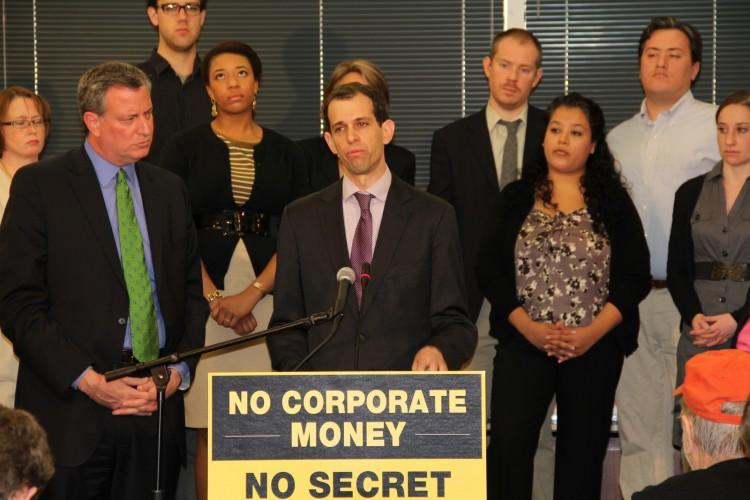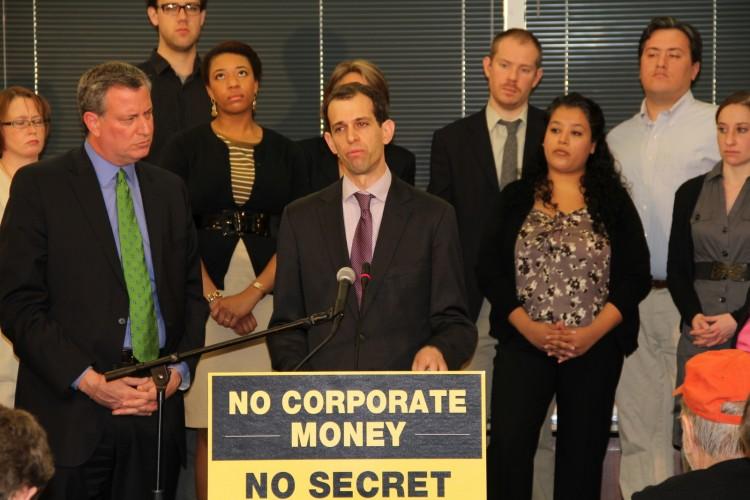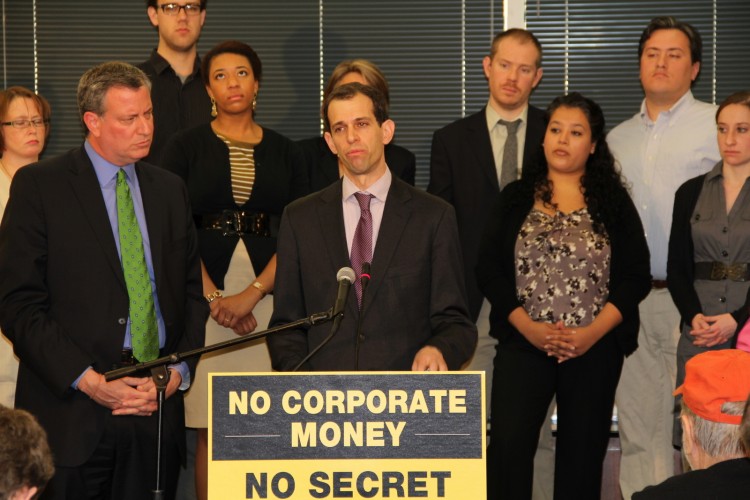A coalition of some of America’s most prominent advocacy groups has warned corporate America not to use company funds to affect the outcome of the fall election, threatening to boycott, name and shame, target shareholder meetings, and use legal means to stop the process.
“If you think you can run money through independent organizations secretly in the 2012 elections, you are wrong,” said Robert Weissman, president of Ralph Nader’s consumer advocacy organization Public Citizen. “You will be found out, you will be held to account, and you—not our democracy—will pay the price.”
The combined warning from a diversity of groups, including the Coalition for Accountability in Political Spending (CAPS), citizens lobby group Common Cause, Americans United for Change, Public Interest Research Group (PIRG), and Occupy Wall Street, comes in response to Citizens United a controversial 2010 decision by the U.S. Supreme Court affecting spending in political campaigns.
The decision allows corporations and unions to use not only political action money, but also their corporate treasury, to fund political activity.
The ruling has paved the way for big-spending Super PACS (Political Actions Committees), which are already impacting the GOP presidential nominee race with massive negative media campaigns.
Super PAC Restore Our Future, backing front-runner Mitt Romney, is the biggest spender in the GOP race, spending $5.7 million on Super Tuesday alone and largely on negative advertising, according to NPR.
Of particular concern is the ability of corporations to funnel funds without disclosure or transparency through trade organizations, like the U.S. Chamber of Commerce, and political organizations like Karl Rove’s American Crossroads GPS.
The advocacy groups believe the decision has given corporations unprecedented political power that will see politicians bought and decisions made by a small number of wealthy interest groups to the detriment of the democratic process.
Speaking at a press conference at the Service Employee International Union (SEIU) headquarters in Washington, D.C., Monday, Bill de Blasio, founder of CAPS and public advocate for the city of New York, says the issue was of bipartisan concern and reflected across ideological and regional divides.
“People are deeply, deeply concerned that money is already too prominent in our political system,” said de Blasio.
“They fear its growing influence and they fear what that means in terms of policies, in terms of what their elected fellows can do to retain independence and open judgment,” he added.
De Blasio said the combined strength of the advocacy groups would see companies boycotted, pension fund money moved from company stocks, public rallies, stockholder lawsuits, and action at stockholder meetings.
“We are putting every CEO in American on notice: If you choose to use corporate treasury funds to make donations to Super PACs or c4 organizations that are attempting to influence the upcoming election, you should inform your board before you do that you will be subjecting your firm to substantial economic risk.”
Corporate Concern
Bob Edgar, a former Pennsylvania congressman and now president of citizens lobby group Common Cause, said there was concern about excessive corporate influence on the political process among the corporate sector as well.
Common Cause has sent letters to 700 top U.S. companies urging them to refrain from using treasury funds for political influence in the coming elections.
“Many of them say they plan to give no money politically,” Edgar told The Epoch Times.
Some companies have already started initiatives on their own. Ice cream makers Ben and Jerry’s is running a campaign to have Citizens United overturned under the title Get the Dough out of Politics.
Common Cause has also teamed up with two large investment funds that have agreed to use their shareholder influence at Bank of America, 3M, and Target annual general meetings to pressure those companies to refrain from political giving.
‘We are also pushing the Security and Exchange Council to require publicly traded companies to disclose their political spending,” Edgar said.
Advocacy group Americans United for Change is offering a reward of $25,000 to the first employee who can document that his or her employer had been using funds to secretly contribute to a nonprofit organization.
“This reward is intended to make CEO’s think again if they believe they can keep corporate donations to politics secret,” Tom McMahon, executive director of Americans United for Change, said in a statement. “It is intended to reinforce the fact that in a digital age it is virtually impossible today for a big corporation to be certain that a donation of this type will not become public, and materially damage its brand and the loyalty of its customers.”
Kate Coyne-McCoy, executive director of CAPS, said the group represents 90 million constituents across America and nearly $1 trillion in pension fund assets.
CAPS would be aggressive in pursuing transparency she said telling reporters, “Secret spending has got to stop, it’s bad for our democracy.”
Coyne-McCoy departed with a final warning to corporate America, “We are everywhere and we are watching. You’ve been served.”






